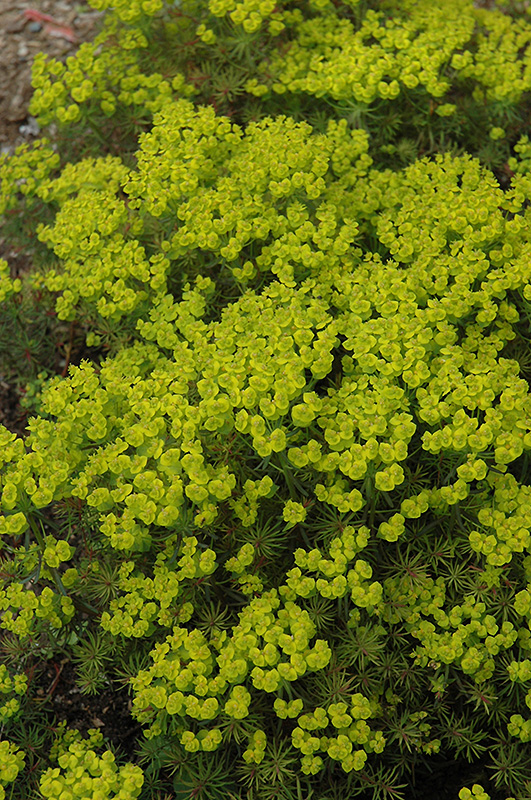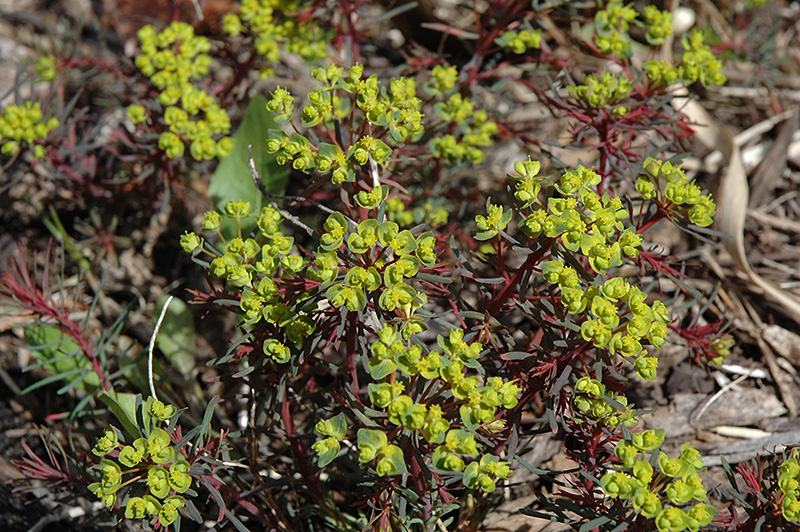Plant Finder
Fen's Ruby Cypress Spurge
Euphorbia cyparissias 'Fen's Ruby'
Height: 18 inches
Spread: 3 feet
Sunlight:
![]()
![]()
Hardiness Zone: 4a
Description:
The leaves on this variety are much finer than other euphorbias; new foliage is plum colored but fades to bluish-green; flowers age to a bright yellow; will grow in rocky compacted soil; semi-evergreen in warm climates; great groundcover for poor areas
Ornamental Features
Fen's Ruby Cypress Spurge has masses of beautiful cymes of lime green flowers with chartreuse bracts at the ends of the stems from mid spring to early summer, which are most effective when planted in groupings. Its tiny narrow leaves are bluish-green in color. As an added bonus, the foliage turns a gorgeous orange in the fall.
Landscape Attributes
Fen's Ruby Cypress Spurge is an herbaceous perennial with a ground-hugging habit of growth. It brings an extremely fine and delicate texture to the garden composition and should be used to full effect.
This is a high maintenance plant that will require regular care and upkeep, and should only be pruned after flowering to avoid removing any of the current season's flowers. Deer don't particularly care for this plant and will usually leave it alone in favor of tastier treats. Gardeners should be aware of the following characteristic(s) that may warrant special consideration;
- Invasive
Fen's Ruby Cypress Spurge is recommended for the following landscape applications;
- Mass Planting
- General Garden Use
- Groundcover
Planting & Growing
Fen's Ruby Cypress Spurge will grow to be about 18 inches tall at maturity, with a spread of 3 feet. Its foliage tends to remain dense right to the ground, not requiring facer plants in front. It grows at a medium rate, and under ideal conditions can be expected to live for approximately 8 years. As an herbaceous perennial, this plant will usually die back to the crown each winter, and will regrow from the base each spring. Be careful not to disturb the crown in late winter when it may not be readily seen!
This plant does best in full sun to partial shade. It prefers dry to average moisture levels with very well-drained soil, and will often die in standing water. It is considered to be drought-tolerant, and thus makes an ideal choice for a low-water garden or xeriscape application. It is not particular as to soil pH, but grows best in poor soils. It is highly tolerant of urban pollution and will even thrive in inner city environments. This is a selected variety of a species not originally from North America, and parts of it are known to be toxic to humans and animals, so care should be exercised in planting it around children and pets. It can be propagated by division; however, as a cultivated variety, be aware that it may be subject to certain restrictions or prohibitions on propagation.





